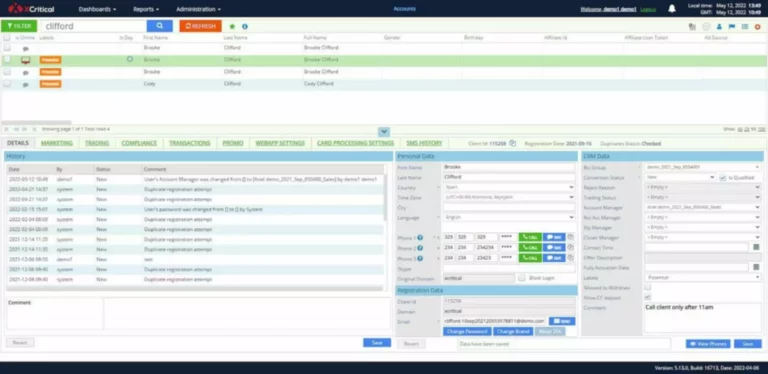Content
When a firm decides to become self-clearing, this introduces additional control and risk factors that should be considered when the firm’s annual audit is Proof of space to be completed. The push to become self-clearing involves implementation of a competent back-office system capable of performing the function of a clearing firm. This will lead to an additional assessment performed by the auditor, as no SOC 1 report for the clearing firm would be available.
Financial Services & Investing Overview
About WYBOTWYBOT is a global leader in innovative pool maintenance solutions, dedicated to transforming pool cleaning into an effortless and intelligent experience. Known for its cutting-edge technology and design excellence, the company is a 2025 CES Best of Innovation Award Honoree. WYBOT has also earned international acclaim, including the 2024 French Design Award, 2024 New York Design Award, and 2024 Paris Design Award, recognizing the company’s commitment to innovation, sustainability, and user-centric design. Over the past several years, pool cleaning technology has evolved from cumbersome wired robots to the cordless convenience of battery-powered robots that reduce user effort yet still require self broker manual maintenance after each cleaning mission.
Should You Choose An Investment App Based On Its Clearinghouse?

Finally, custody fees are charges for holding and safeguarding clients’ securities and other assets. These fees cover the costs of maintaining custody accounts, providing secure storage facilities, and administering asset transfers. Custody fees are more often calculated on a periodic basis, such as https://www.xcritical.com/ monthly or annually. They may also be calculated as a percentage of the total value of assets under custody.

Benefits and Challenges of Self-Clearing Broker-Dealers
Tracking stock ownership used to be a very manual process tied to actual possession of physical stock certificates, but nowadays the process is almost entirely electronic. The DTCC is owned by a large consortium of financial institutions, and it operates as an industry utility, much like FINRA. Chances are if you opt for a direct market access broker (DMA), the broker has done the research for you.
- When selecting an online broker, it’s also prudent to consider their clearing firm in the decision-making process.
- A self-clearing broker tends to have more autonomy and agility in making decisions but requires much more capital to function.
- In this case, the clearing firm selects buyers and sellers, taking on all legal and financial risks within the framework of the transaction.
- Available for pre-order on , starting in Q2, the WYBOT S3 Pool Cleaning Robot will be priced at $2,999.
- Robinhood, for example, switched from clearing through Apex to self-clearing a little over a year ago, and that seems like it was a massive undertaking.
- The size of their end-user customer base determines how effective their ability to scale benefits for clients can be.
Custody, Margin, and Stock Loan
For additional insight as to potential impacts that should be considered an individual company, please feel free to reach out to Baker Tilly. Have you ever seen a stock exhibiting normal trading behavior and then all of a sudden the stock price drastically drops out of nowhere? This type of price action could be related to the announcement of a shelf offering or the execution of an “at-the-market” sale from… TheCollegeInvestor.com has an advertising relationship with some or all of the offers included on this page, which may impact how, where, and in what order products and services may appear. The College Investor does not include all companies or offers available in the marketplace. And our partners can never pay us to guarantee favorable reviews (or even pay for a review of their product to begin with).
Also referred to as clearing houses or clearing corporations, these firms house the actual stock certificates and contracts to expedite the clearing process. Imagine how aggravating it would be if you were required to go through this process every time you bought or sold any stock. Thankfully, these tasks are handled seamlessly and efficiently every day by clearing firms. There are special brokers on the market that have the necessary resources to carry out the clearing process. This type of broker, among other things, actively carries out settlements on all transactions and acts as a clearing house, which explains its name – self-clearing.
Broker-dealers play a crucial role in the financial markets, acting as intermediaries between buyers and sellers of securities. However, not all broker-dealers are the same; they differ based on how they handle clearing and settlement operations. That removes the friction from the client onboarding process and shortens the time to open accounts to “a few minutes.” An advisor can also access everything from performance reports to fee billing all in one application. Yet it was still an “introducing broker/dealer.” It could accept trade orders, but not the money for the trades nor could it hold client securities directly. It was in essence a tech overlay on top of Apex Clearing, the behind-the-scenes custodian to the advisors using its platform. In some cases, these fees were fixed and simply non-negotiable, whereas other clearing firms were willing to completely scrap or restructure their proposal based on our preferences.
A retail broker, for example, might use an omnibus arrangement because it has many small customers such that it might be unwieldy to maintain separate accounts. Additionally, the clearing broker often provides additional services beyond just clearing. One of the more prominent factors that influence a firm’s decision is the control over the trading process, which might not be attainable if they used an external third party.
Pretty much all bulge bracket banks have investment arms and proprietary trading desks, as well as broker-dealer arms that provide both execution and clearing services and that operate one or multiple dark pools. It’s easy to imagine how there are both potential efficiencies and potential conflicts of interest introduced by a single financial institution performing multiple different functions in the trading life cycle. In our case, however, all of these parties will generally be completely separate, and Proof Services, our broker-dealer subsidiary, will just be the executing broker in the equation. Here’s what you need to know about these independent companies that are involved in all your securities sales.
This process lasts for several working days and is called T+2 (the date when the deal was concluded + 2 additional days). It is worth noting that traders have a special advantage in the trading process thanks to margin accounts, which allow placing more orders without waiting for actual settlements because the funds are borrowed and returned after the deal is closed. However, in most cases, brokers delegate this function to a clearing company that settles transactions for a certain fee because such a back-office is very expensive and time-consuming for many of them. First, general clearing members act as intermediaries between trading parties and central clearinghouses. They facilitate trade settlement by matching buy and sell orders, ensuring compliance with clearinghouse rules, and assuming responsibility for risk management.
There’s also the risk of not receiving your stock certificates if the seller decides to renege on the trade (i.e. stock spikes much higher, seller decides to keep the stock). Don’t forget about registering that transaction with the exchanges and the DTCC to accurately record the new owner of the shares. When you’re ready to sell the shares, just repeat the whole process on the other side as a seller. It will make money from payment for order flow, but that is “negligible,” Wenk said, and they’ll be more focused on delivering best execution of trades. Some of those functions were built in-house, while some were brought in through partnerships.
Clearing firms are also responsible for ensuring the funding and delivery of securities between counterparties. A clearinghouse (also called a clearing firm) is an independent company that matches buyers to sellers in a securities transaction. By law, all clearing firms must be members of SIPC (Securities Investor Protection Corporation) so that they can offer financial protection to brokers. Cetera Investment Services LLC offers the highest quality service through our team of qualified and knowledgeable employees.
We modeled out our projected volumes to make sure that our business is sustainable at scale. It appears that the most common approach is a per-ticket charge, but for our use case a simple per share fee with no ticket or execution charges was the most viable path. Our initial expectations around clearing costs turned out to be reasonable, and any of the four proposals could ultimately have worked for us.